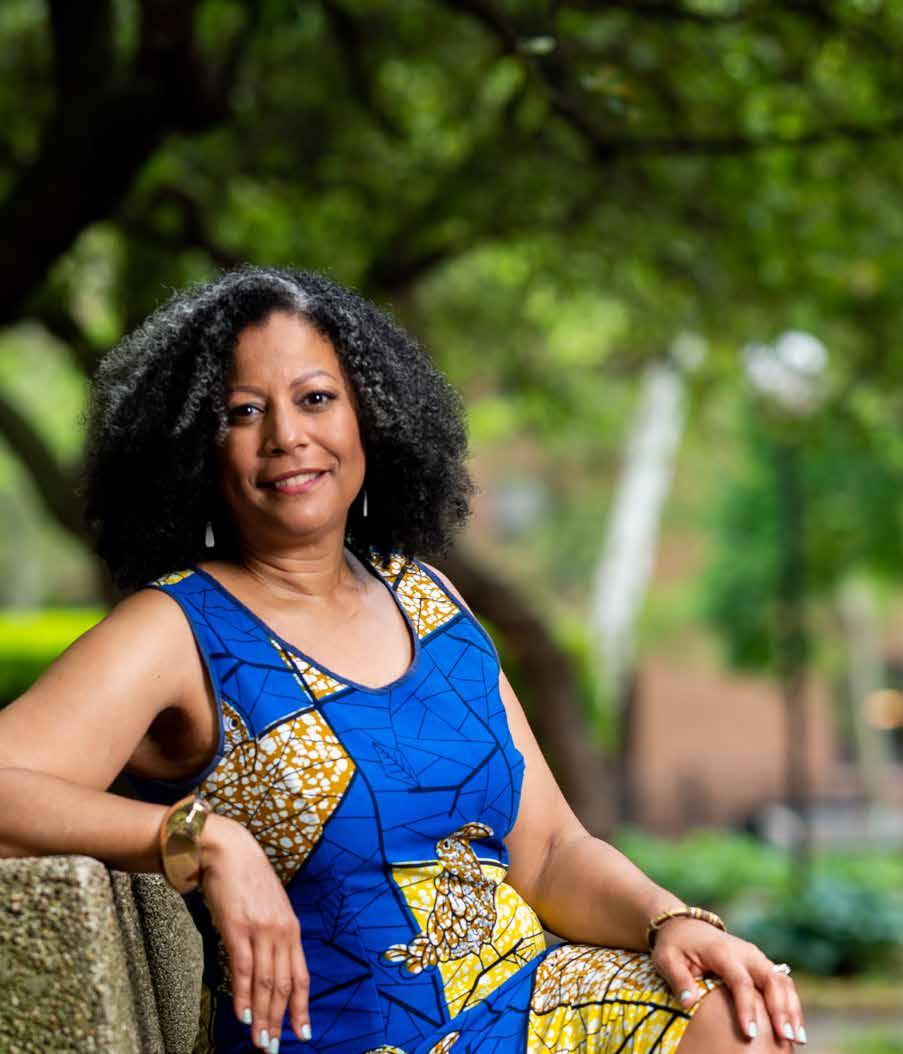
THE 12 REIMAGINING THE MESSIAH EXPERIENCE There are so many ways to get a degree—or two 18 COMMENCEMENT FOR CLASS OF 2022 563 undegrads, 281 advanced degrees, 1 DPT cohort MESSIAH UNIVERSITY ALUMNI MAGAZINE VOLUME 2 2022
Mentee
mentor Fabienne Doucet ’95 makes executive director position all about helping others
26
to
INSIDE LOOK
In April,
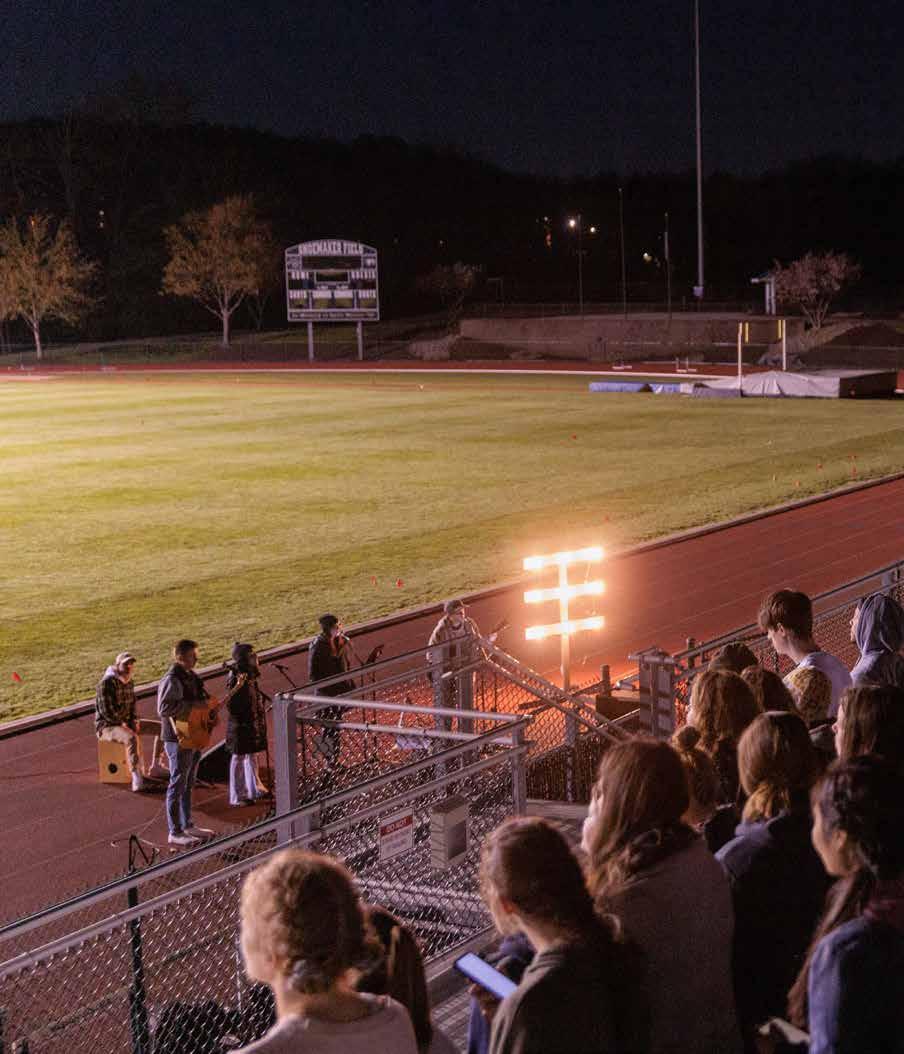
TENNISON
Messiah students gathered for a special outdoor session of Powerhouse at Starry Field.
MATTHEW
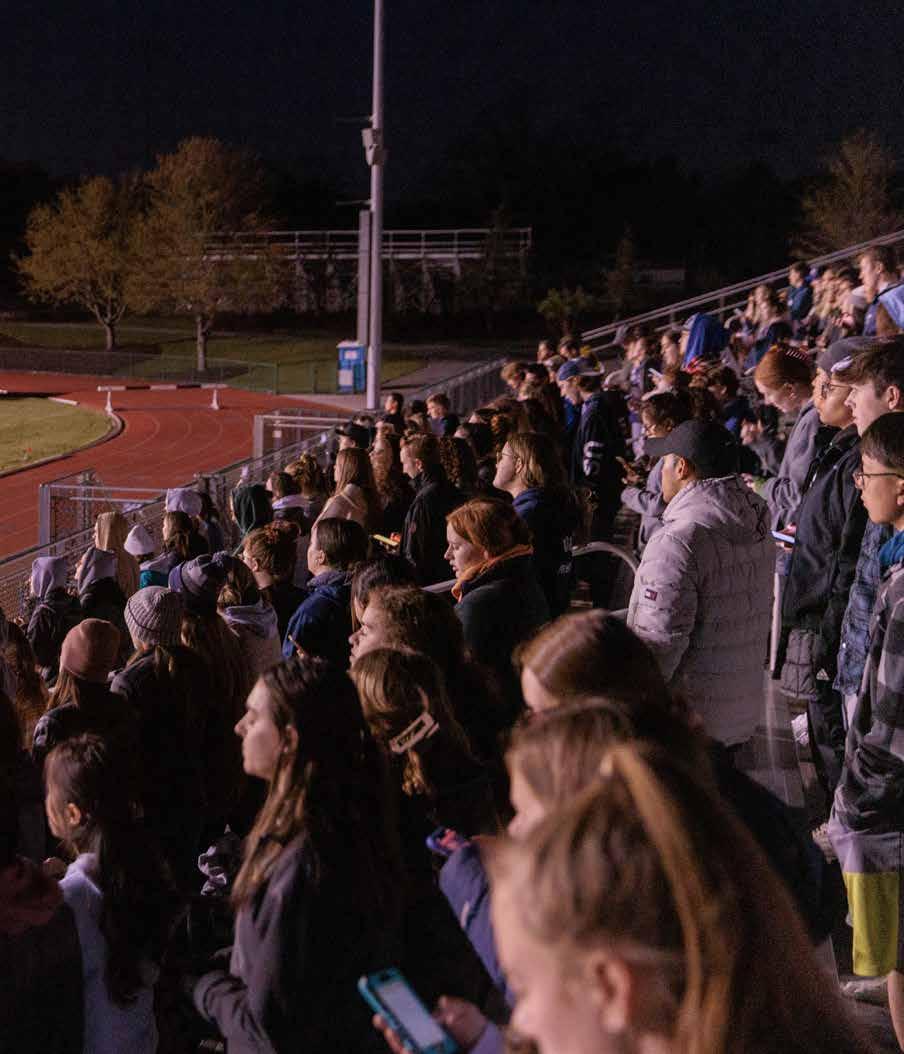
POSTMASTER: Send address changes to Office of Marketing and Communications One University Avenue, Suite 3020 Mechanicsburg, PA 17055 717.691.6027 | www.messiah.edu
 PRESIDENT Kim S. Phipps VICE PRESIDENT FOR ADVANCEMENT Barry Goodling
PRESIDENT Kim S. Phipps VICE PRESIDENT FOR ADVANCEMENT Barry Goodling
’79
ASSOCIATE VICE PRESIDENT OF MARKETING & COMMUNICATIONS Carla E. Gross EDITOR
Anna Seip GRAPHIC DESIGNERS
Curt Rohrer
Matt Logan, M.A. ’17 DIRECTOR OF ALUMNI & PARENT RELATIONS
Jay McClymont ’92
CONTRIBUTORS
Molly McKim ’23, Devin C. ManzulloThomas ’09
The Bridge (ISSN-0279-3938) is published three times a year by the Messiah University Office of Marketing and Communications for alumni and friends of the University, free of charge. Please contact us at aseip@messiah. edu or 717-691-6027. Items for the alumni news section should be identified by class year and sent to the Messiah University Office of Alumni and Parent Relations, One University Avenue Suite 3023, Mechanicsburg PA 17055. You may email them to alumni@messiah.edu or fax them to 717-796-5371.
As its name suggests, The Bridge connects alumni, parents and donors with Messiah University. It also serves to build the University’s image with these audiences. It does this by publishing accurate news about the University and about alumni and by offering interesting feature articles that are issue- or University-related for readers’ continued education. Messiah University accepts news submissions from alumni and the broader community but reserves the right to edit or decline to print materials at its discretion.
Messiah University is a Christian college of the liberal and applied arts and sciences. The University is committed to an embracing evangelical spirit rooted in the Anabaptist, Pietist and Wesleyan traditions of the Christian Church. Our mission is to educate men and women toward maturity of intellect, character and Christian faith in preparation for lives of service, leadership, and reconciliation in church and society.
Messiah University does not discriminate on the basis of gender, race, color, disability and national or ethnic origin in the administration of its educational policies, scholarship and loan programs, and athletic or other Universityadministered programs.
© 2022 Messiah University
COVER: Fabienne Doucet ’95 works as an executive director with a passion for mentorship.
LUDWIG BORGELLA PHOTOGRAPHY
FEATURES
REIMAGINING THE MESSIAH EXPERIENCE
Students have many avenues in which to earn credits and degrees.
COMMENCEMENT
Read all about the Class of 2022’s Commencement ceremonies for undergradaute and graduate students. We had many milestones this year!
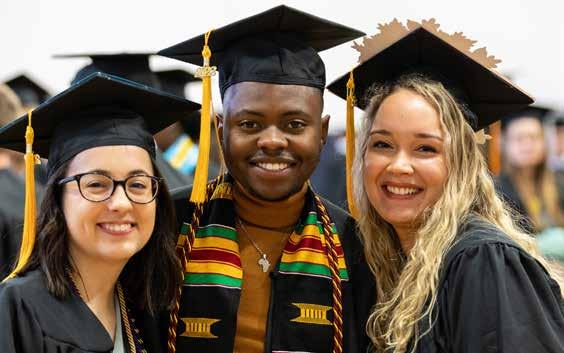
THE
TABLE OF CONTENTS
12
18
18
MESSIAH UNIVERSITY ALUMNI MAGAZINE
VOL. 114, NO. 2 The Bridge is printed on recyclable paper: 50/25 PCW EFC 2 | VOLUME 2 2022 • THE BRIDGE • MESSIAH UNIVERSITY
FROM THE EDITOR
THIS SUMMER, I JOINED THE CIVIL RIGHTS BUS TOUR, TRAVELING 2,600 MILES TO EIGHT STATES OVER NINE DAYS. SOMEHOW, I ALSO ENDED UP WITH 40+ NEW FRIENDS–WHICH, FOR AN INTROVERT, IS A LOT TO TAKE IN. THE ONLY WAY WAS THROUGH. WE ATE EVERY MEAL TOGETHER, TALKED LATE INTO THE NIGHT, LAUGHED, CRIED, SANG TV SHOW THEME SONGS ON THE BUS AND, BY THE LAST DAY, ASKED EACH OTHER, “WE’RE STILL GOING TO BE FRIENDS AFTER THE TOUR, RIGHT?”
Yes, we are. Since then, we’ve wan dered into each other’s offices often, some of us not realizing until after the tour that we worked in the same building! This experience–in addition to showing us the historic sites such as the Edmund Pettus Bridge in Selma and the Lorraine Motel in Memphis, among so many others–created connections among us that helped us build relationships and, subsequently, do our work better. We’ve also scheduled lunches, cof fees and backyard fire pit sessions at each other’s homes to keep the tour going among us.
While on the bus, I had the pleasure of riding with eight Messiah students. You’ll get to meet one, Pauline Deutcheu Tchouako ’23, student body president, on p. 10. In her profile, read all about the importance of student scholarship aid, a vital part of our capital campaign.
This issue includes a feature story on p. 12 about how Messiah is reimag ining the university experience by offering dual enrollment, early assurance, accelerated programs and more. Also, you’ll find Commencent coverage on p. 18.
We hope you enjoy this issue of The Bridge.
ANNA SEIP , EDITOR
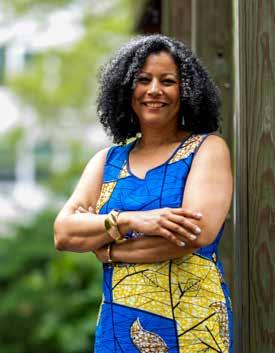
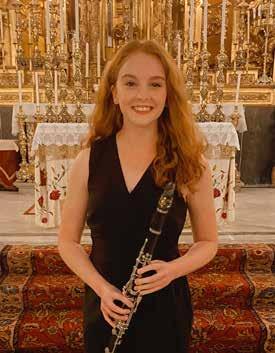
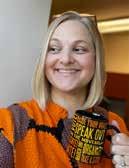
DEPARTMENTS 4 FROM THE PRESIDENT 5 OUR CAMPUS 5 Heard Around Campus 6 Campus News 8 Faces and Places 9 Brainwaves 10 Capital Campaign 26 OUR ALUMNI 26 Alumni News 27 Alumni Profiles 30 Class Notes 32 From the Archives ONLINE EXTRAS
Give to The Messiah Fund at messiah.edu/SupportStudents Learn about the DPT program at messiah.edu/DPT Find about Messiah’s partnership with Camp Cho-Yeh at messiah.edu/choyeh Explore dual enrollment for your high schooler at messiah.edu/dual 23 26
MESSIAH.EDU/THE_BRIDGE
MESSIAH UNIVERSITY • THE BRIDGE • VOLUME 2 2022 | 3
As agents of grace, we persist as peacemakers

An excerpt from the charge I was privileged to share with Messiah University’s undergraduate Class of 2022, these words are powerful reminders for all of us:
I am honored as your president to share a few final thoughts with you, the Messiah University Class of 2022. I have enjoyed getting to know many of you during the past four years, despite stretches of time when COVID precautions required us to socially distance and interact less frequently. I commend your resilience, adaptability and creativity as we responded, “Together at Messiah!”
Your formal undergraduate studies have concluded, but your Messiah education is an important foundation upon which to layer a lifelong commitment to intellectual, personal and spiritual growth. Read actively across genres; engage complicated ideas with thoughtfulness and humility; challenge yourself to learn and try new skills; welcome civil conversations in which you can gain increased understanding; and seek daily opportunities to be God’s agents of reconciliation.
This past academic year, we have focused considerable time and attention on the Scriptural call in 2 Corinthians to be God’s ambassadors of reconciliation. As a campus community, we embarked on a process of listening, lamenting and allowing our hearts and minds to connect with people’s stories of pain, marginalization and injustice, and we learned the necessary role forgiveness plays in the journey toward reconciliation. Your journey—and mine— as peacemakers and reconcilers must persist. We must continue to seek transformative action that repairs and restores broken relationships and systems — praying for and encouraging each other along the way.
As you leave the Messiah campus, I challenge you to be agents of grace—a counter-cultural calling in this current historical moment. It is so sad that, even as Christ followers, many expect us to match the deplorable tone, vehemence and outrage of current conversations —whether we’re interacting on social media, attending local school board meetings or having personal conversations.
At Messiah, you have learned an alternative way of living as a Christ-follower. Jesus Christ, who is described in the Gospel of John as “full of grace and truth” (John 1:14), is our model. His interactions with people of various economic and social classes, cultural and ethnic backgrounds, religious faiths and different personalities throughout the Gospels demonstrate how we, too, can respond in the fullness of truth and grace without harshness, sarcasm or cynicism. Serving, leading and pursuing the journey toward reconciliation with grace doesn’t mean that we value false unity above all else or that we don’t identify and work to address injustice. Rather, we invite and allow the Holy Spirit to influence our thoughts, words and deeds as we refrain from labeling anyone who disagrees with us as the enemy.
“Your journey—and mine—as peacemakers and reconcilers must persist. We must continue to seek transformative action that repairs and restores broken relationships and systems — praying for and encouraging each other along the way. ”
—
Kim S. Phipps, President
When I look out at your faces and remember your stories, your questions, your service, your accomplishments and your positive contributions to the Messiah University community, I am hopeful. May your grace-filled presence in the world—in your homes, churches, communities and workplaces—be a beautiful testament to your Messiah University education and, even more importantly, a witness to the Jesus of the Gospels. May He sustain and guide you now and forevermore.
KIM S. PHIPPS, PRESIDENT

THE PRESIDENT
FROM
PHOTOGRAPHY
PHOTO: RYAN SMITH
4 | VOLUME 2 2022 • THE BRIDGE • MESSIAH UNIVERSITY
“An informative speech (on John Cena)” – Marian Ambrosino ’24, biology major “A semesterlong project that involves interviewing a living composer” – Jaden Collado ’23, music education major “A sound escape project where we had to tell a story through sounds” – Jarek Nalewak ’24, communication major WHAT’S THE MOST INTERESTING ASSIGNMENT A PROFESSOR HAS EVER GIVEN YOU? “A collaborative poem” – Nate Castellitto ’23, English major “ The sixer project ... we film and direct another person’s storyboard” – Marleigh Flanagan ’25, communication major “ Making memes out of the visual system” – Emily Robinson ’23, biopsychology major HEARD AROUND CAMPUS “ To write a sequel to a book we read in class” — Elisabeth Zimmerman ’26, art education major “ Making a car out of food for an engineering class” — Brayden Parks ’25, civil engineering major “ Writing a paper about someone in the area who advocates racial justice” — Julia Wittel ’23, English major MESSIAH UNIVERSITY • THE BRIDGE • VOLUME 2 2022 | 5
Messiah’s Doctor of Physical Therapy program granted CAPTE accreditation
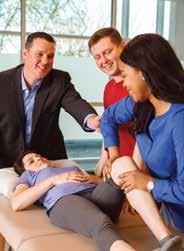

The Commission on Accreditation in Physical Therapy Education (CAPTE) has granted accreditation to Messiah University’s Doctor of Physical Therapy (DPT) program.
“Having a CAPTE-accredited program is more than just an indicator of quality, it is essential to obtaining physical therapy licensure,” said Karl Bergmann, Messiah’s Doctor of Physical Therapy program director. CAPTE accredits physical thera py programs to assure the quality of course work and that programs produce graduates qualified to serve the public.
“Our faculty, staff and admin istration have worked diligently to develop a DPT program that meets all of the CAPTE stan dards and is aligned with the Messiah University mission,”
said Rob Pepper ’92, associate provost for graduate and pro fessional studies and university partnerships. “Achieving CAPTE accreditation during the challeng es over the past two years due to COVID-19 is a testament to the members of Messiah University who have labored together to build this outstanding program.”
Messiah University’s DPT program is a full-time, residential, 110-credit program designed to prepare physical therapists for careers as practitioners, educators, administrators and consultants in a variety of professional settings in cluding hospitals, clinics, rehabili tation centers, homecare programs, schools and private practices.
“In addition to accreditation, Messiah’s DPT program offers faith integration, faculty with ex pertise in multiple PT specialties
and the opportunity to study and train at Winding Hill,” said Bergmann. Winding Hill is a newly designed education facility customized to the needs of physi cal therapy students and includes exercise, cadaver, musculoskel etal and pediatric labs as well as dedicated research rooms and a full-sized, activities-of-daily-living apartment.
Messiah University is the first institution within the Council for Christian Colleges and Universities in the Northeast or Mid-Atlantic Region to offer a graduate program in physical ther apy. The first cohort of the DPT program graduated in May 2022. — Staff report
LEARN MORE AT MESSIAH.EDU/DPT.

MESSIAH PARTNERS WITH HACC

Messiah and Harrisburg Area Community College (HACC) will partner to provide a R.N.-to-BSN pathway for HACC nursing graduates to transition to Messiah to earn a Bachelor of Science in Nursing (BSN).
for the first semester.
At the High Center Season Keynote Lecture, Dr. Mae C. Jemison, the first woman of color to travel in space, addressed the audience at Parmer Hall April 13. She discussed her 1992 voyage aboard the Space Shuttle Endeavour, STEM and her Look Up campaign, which encourages people to stop and simply look up, since we all share the same sky. This lecture was sponsored by the Office of the President.
Through the agreement, students who satisfactorily complete the Associate Degree in Nursing (ADN) from HACC and who are licensed registered nurses will receive full recog nition of that degree, and all credits will be applied toward the completion of the Messiah BSN. Coursework at Messiah will be 100% online, and on-site clinical requirements can most likely be met at the student’s place of employment. Participants will receive a 10% tuition discount each semester and a $200 book grant
“It has been delightful to work with our colleagues at HACC to bring this partnership to fruition as we strive to deliver a quality program and be the first-choice nursing graduates consider for completing their next degree,” said Brenda Elliott, assistant professor of nursing and coordinator of MSN, CAGS and R.N.-toBSN programs at Messiah.
“This agreement strength ened the transferability of HACC credits and additionally stream lined the pathway to earning an advanced master’s degree,” said Monica J. Filburn, chair of HACC’s Department of Nursing. The curriculum includes six graduate credits that could later be applied to an advanced nursing degree at Messiah.
— Staff report
CAMPUS NEWS OUR MATTHEW TENNISON
JAREK NALEWAK ’24
6 | VOLUME 2 2022 • THE BRIDGE • MESSIAH UNIVERSITY
See what our grads have to say about the program on p. 25.
Messiah students traveled to Warsaw, Poland, this summer to teach English to middle and high school students. Students also assisted in humanitarian efforts to help refugees from Ukraine.

STUDENTS VISIT POLAND FOR SERVICE TRIP
TEACHING STUDENTS, HELPING WITH UKRAINE REFUGEE EFFORTS

Through the Agapé Center, several students traveled to Poland for a service trip to partner with Polish Christian Ministries (PCM) May 20-June 1. Tina Keller, chair of the Department of Education and associate professor of TESOL, served as the group leader on the trip.

“We taught English in Polish middle and high schools in Warsaw,” explained Keller. “We also assisted in humanitarian work with Ukrainian refugees in the city, such as assisting in buying shoes.”
Several Messiah students participated in the trip. Mireliz Bermudez ’23, an education major with a dual certification in early childhood education and special education with minors in ESL and language pathology, says the trips allowed her to speak and teach English learners (ELs).
“Having been an EL myself, I thought that I would be able to not only experience teaching in a foreign country but relate to the high school and middle school students. It was amazing to see how quick the students were able to show off their English and
Spanish skills, especially since Spanish is my first language,” said Bermudez, who is serving as student body vice president.
Between a global pandemic and war in nearby Ukraine, the students remained flexible amid uncertainty in a new culture.
“The Agapé Center did a great job of keeping the students on the service trip safe and well-in formed,” said Bermudez. “Every day before the trip brought a new wave of compassion to serve in the community of Warsaw. Overall, I was very humbled by the experience and feel even more confident in my decision to become a teacher.”
Keller echoes that sentiment.
“It was a gift to witness the love that poured out of Warsaw to Ukrainian families fleeing the war. Christians sacrificially loving like Christ was on display, and it impacted the whole atmosphere of the city. I could see it changing our students, and it is still chang ing and challenging me.”
— Anna Seip
PHOTOS
COURTESY OF TINA KELLER
“OVERALL, I WAS VERY HUMBLED BY THE EXPERIENCE AND FEEL EVEN MORE CONFIDENT IN MY DECISION TO BECOME A TEACHER.”
Miraliz Bermudez ’23
Warsaw MESSIAH UNIVERSITY • THE BRIDGE • VOLUME 2 2022 | 7
ADOBE STOCK
Building relationships and highways
ENGINEERING ALUM WRAPS PROJECT
IN ZAMBIA, BEGINS ROAD DESIGN CAREER
As a civil engineering major, Claudia Tolley ’22 found a job after graduation at STV Inc. in Harrisburg as a highway design en gineer. After taking a traffic flow class at Messiah, she knew she wanted to work in road design.


WHATCAN YOUDOWITH ANENGINEERINGDEGREE?
“I help with improving intersections for major high ways, exits and entrances of highways, and traffic flow.”
Her story begins, however, in the Collaboratory. After being grounded for two years because of COVID, the Collab teams were able to travel again this summer. In May, Tolley finally traveled to Zambia as the stu dent project manager for the egg incubators project.
Partnering with the Brethren in Christ church there, she and the team spent two weeks staying in the mission outside Choma, where they were warmly welcomed by those who lived there.
“It was a two-minute walk to church in the village. They just immersed us into their welcoming com munity,” said Tolley. “It felt like we were so united. We were worshiping the same God beside them. That was so cool to see.”
Why is there a need to incubate eggs? Chicken is in high demand in the area, but it’s not an easily accessible food source.
“Most of the chickens just lay their eggs. They don’t brood the eggs well and leave them to fend for themselves,” explained Tolley.
By finding and placing the
eggs in the incubators, however, people can ensure a larger pro duction of food for themselves.
The team began the prototype at Messiah then built a final version in Zambia using local source materials. The experi ence became a huge part of her Messiah journey.
“I didn’t know about the Collab when I came to Messiah,”
she said. “You connect your ac ademics and apply it to real-life projects. It’s not just a capstone project. You can see the im pact you’re making on people. It’s brought a great closure to my time at Messiah, applying knowledge to better serve people all around the world.”
FACES AND PLACES OUR
— Anna Seip
After graduation, Claudia Tolley ’22 began working as a highway design engineer at STV Inc. in Harrisburg.
“You can see the impact you’re making on people. It’s brought a great closure to my time at Messiah, applying knowledge to better serve people all around the world.”
Claudia Tolley ’22
PHOTOS COURTESY OF CLAUDIA TOLLEY ’22 8 | VOLUME 2 2022 • THE BRIDGE • MESSIAH UNIVERSITY
NEW BOOK PROVIDES NEW LOOK AT THE GOOD SAMARITAN

EMERSON POWERY REIMAGINES PARABLE FROM MULTIPLE POINTS OF VIEW IN WRITING EXERCISE
The parable of the good Samaritan in Luke 10 is one of the most well-known Bible stories. Emerson Powery, professor of biblical studies and assistant dean of the School of Arts, Culture and Society at Messiah, chose to explore it when he was asked to help write one of 12 books about key biblical passages in a series by Stephen Chapman, professor of Old Testament at Duke Divinity School.

“The Good Samaritan: Luke 10 for the Life of the Church” by Powery is the second in the series. He opens the book by defining what the church is.
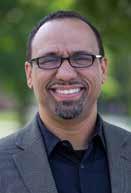
“My local church doesn’t represent everyone’s [experience]. I wanted to speak to two things in that chapter: to define the church out of which I speak and to define how people read scripture. Each would read this parable differently because of different perspectives that they bring, so that’s the way in,” he explained.
He then looks at four figures–St. Augustine, Howard Thurman, a community from Nicaragua called the Solentiname commu nity and Harriet Jacobs–to think about different perspectives and the history of the church and how this parable has affected different places.
Powery also explains that the audience for the book is an informed church, one that understands it’s not as simple as reading a scripture passage and applying it.
“In light of our present moment, for which I write, I defined it as ‘Samaritan lives matter’ because it’s caught up in Jesus
telling this story and the fact that he doesn’t choose a common Jew and he chooses a Samaritan,” said Powery.
One thing that sets the book apart is that Powery wrote retellings of the good Samaritan from a character that he’s imagining in the story.
“As an example, I have a Jewish female telling the story, and she’s in love with the Samaritan. She retells the story and thinks about how sometimes imagination can help us rethink our lives, because Jesus’ parable is a made-up story. I try not to lose that sense of Jesus’ attempt to imagine the world differently,” he said.
In the book, he discusses the importance of the imagination for the contemporary church. He explains that the telling of a parable is an imaginative exercise, one which will provoke people, as Jesus does.
“Rewriting the story over and over again from different charac ters forced me to think about the story again in a different way,” he said. “I’ve actually incorporated 5-minute freewrites into my Bible classes, imagining a character in a story and then retelling it. I did it so we can talk about interpretation, and it went much better than I was expecting.”
The freewrites have become a necessary part of his classroom. “The stories that we tell matter. The words that we use in telling those stories matter. People who become the central characters and the heroes of our stories matter,” he said.
— Molly McKim ’23 and Anna Seip
In his new book, Emerson Powery, professor of biblical studies, examines the parable of the good Samaritan.
BRAINWAVES
“REWRITING THE STORY OVER AND OVER AGAIN FROM DIFFERENT CHARACTERS FORCED ME TO THINK ABOUT THE STORY AGAIN IN A DIFFERENT WAY.”
— Emerson Powery, professor of biblical studies and assistant dean of the School of Arts, Culture and Society
MUSEUM OF ART MESSIAH UNIVERSITY • THE BRIDGE • VOLUME 2 2022 | 9
COURTESY OF BAKER PUBLISHING GROUP AND THE METROPOLITAN
Impact the life of a student
THE MESSIAH FUND & SCHOLARSHIP AID NEEDS YOUR HELP
The role of a godparent is to guide a child with a religious upbringng. For Pauline Deutcheu Tchouako ’23 (right), her godpar ents took it a step further and helped her choose a college.
Although she was born in Cameroon, she and her family came to the U.S. when she was a child. Growing up in Maryland, she heard of Messiah because her godparents’ children attended here.
“So, I came up for a weekend, went to a soccer game,” she said. “They showed me how to order the best combination of food from the Union. Seeing it from their perspective, I could see myself being here.”
ENGINEERING A PLAN
“I knew I was going to be an engineer since my freshman year of high school,” she said. “Seeing the Collaboratory was very com pelling. There was a lot of access to equipment. It was very handson. Other schools didn’t have a program like that.”
Messiah had the major she wanted, but could she afford it? As a Martin Scholarship recip ient, an important piece of the puzzle fell into place.
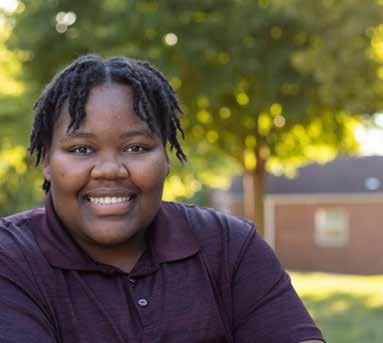
The Martin Scholars program seeks to foster scholars aca demics, service and leadership while encouraging a critical awareness of race, diversity and reconciliation. The scholars are equipped with the tools to engage in university-related activities. They are also connected with faculty mentors for the purpose of establishing healthy lifestyles with respect to opportunities
for service, exploring a major or field of study, career goals and personal and/or spiritual growth. Students are encouraged to use this knowledge and experiences to promote justice an equity on campus and beyond.
Recipients also come into the program as a cohort. “There are 13-15 spots, four of them are full tuition. Messiah is really inten tional about having the cohort of students be multicultural and diverse,” she said. “My cohort are my closest friends. Knowing there’s a set group who’s seeing the world from my point of view was really helpful my freshman year in navigating Messiah. That’s a feature of the scholarship that makes the experience so much better.”
COLLABORATION
Now a senior, she began her term this summer as student body president, working in the Office of Student Engagement laying the groundwork for the bigger ideas from her campaign.
“I’m in charge of the diplo matic corps of students,” she explained. “We want students to have a broader voice in deci sion-making.”
She also stays busy with the Collaboratory, serving on the wheelchair team making proto types that can be replicated and repaired in underserved commu nities in Nepal.
What advice would she give to a prospective student? “Messiah as a university really pushes for exploratory conversations, differ ent views,” she said. “You can still be a Christian and believe the exact opposite of me, and that’s OK. Let’s talk about it.”
–Anna Seip
Generous alumni, parents and friends of Messiah have helped us achieve the $75 million goal of The Campaign for Messiah University: Learning for Life, Transforming the World. We are continuing to raise additional funds, specifically to support The Messiah Fund & Scholarship Aid. Your gift will have an immediate and direct impact on the life of a student–such as Pauline–who deeply desires a Christian education and needs financial assistance to fulfill that dream .
Make your gift today at messiah.edu/campaign4messiah
CAMPAIGN UPDATE OUR
10 | VOLUME 2 2022 • THE BRIDGE • MESSIAH UNIVERSITY
INSIDE LOOK
Hosted by the Agapé Center for Local and Global Engagement, Service Day returned this year after a two-year pandemic pause. Students, faculty and staff served as a collective community on campus and in the greater Harrisburg community.
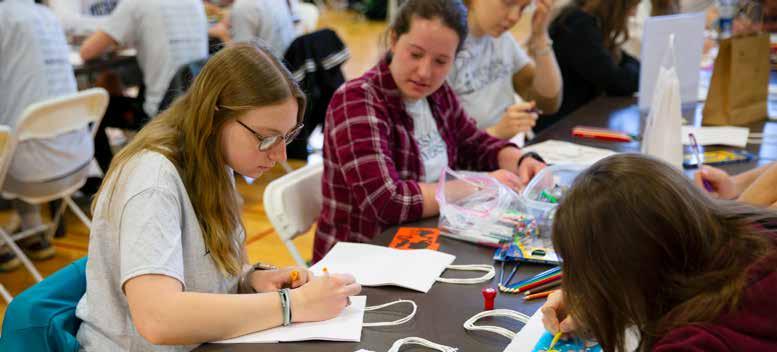

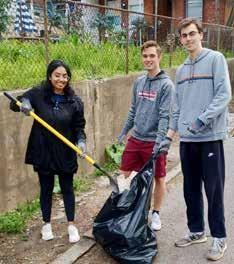
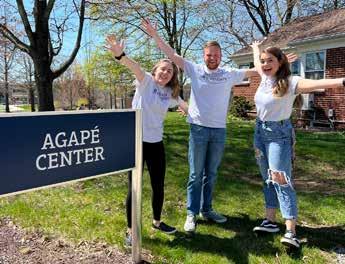
SERVICE DAY 32 996 5,241 different service locations registered volunteers total collective hours served
BY THE NUMBERS
MESSIAH UNIVERSITY OFFICE OF MARKETING AND COMMUNICATIONS
“Service is in the DNA of Messiah, and it’s a joy to be part of it.”
—Katie Rousopolous. director of the Agapé Center
FEATURE STORY 12 | VOLUME 2 2022 • THE BRIDGE • MESSIAH UNIVERSITY
By Anna Seip
24/7 CLASSES, EARLY GRADUATION, TEACHER CERTIFICATION, BACHELOR’S TO MASTER’S AND MORE 24/7
REIMAGINING THE UNIVERSITY EXPERIENCE THE MESSIAH WAY MESSIAH UNIVERSITY • THE BRIDGE • VOLUME 2 2022 | 13
It’s
DUAL ENROLLMENT
In Pennsylvania, a student who is still en rolled in high school can also enroll in college courses–and secure credit in both.
Finance major Kaitlyn Naylor ’26 began dual enrollment courses at Messiah the sum mer before her junior year of high school.
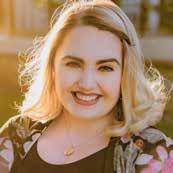
“I took mainly online asynchronous cours es, because those are the most flexible and it allowed me to work around my high school schedule,” said Naylor.
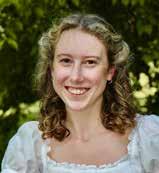
In total, Naylor earned 25 college credits through dual enrollment. While the bulk of those were taken online, she also took an on-campus class, Principles of Management (BUSA 120), in person during her senior year of high school.
“I was able to experience the college classroom by interacting with the professor and working on projects with college students
as if I were a full-time student on campus,” Naylor said.
While other colleges and universities offer dual enrollment, Messiah’s courses are, of course, faith-based.
“I appreciated how the professors openly talked about their faith and the learning pas sion that the students had. Also, by spending time on campus as a dual enrollment student at Messiah, it reinforced and confirmed my decision to attend Messiah University because of the community and friendliness of people on campus,” said Naylor.
Dual enrolled students are allowed to take two courses a semester at the highly reduced rate of $150 per hour.
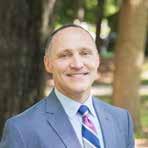
“They apply in the spring of their sophomore year, and they register for classes typically in July, and they come to orientation in August,” said John Chopka, vice president for enrollment manage ment.
The classes that are popular and/or necessary for high school seniors include offerings such as history, English literature, psychology, Spanish, Chinese, among others. About 140 high school students are opting for dual enrollment this fall.
“We worked with guidance counselors from feeder schools, they helped us draft a cur riculum. These are the courses students are looking for,” explained Chopka.
For Kaylee Enck ’23, public relations major with a psychology minor, as a senior at Big Spring High School, she needed only 1-2 classes to graduate and that left a lot of space in her schedule. Her guidance coun selor suggested dual enrolling at Messiah. She took Intro to Psychology in the fall 2019 semester along with Fundamentals of Oral Communication, Problems in Philosophy and Statistics for spring 2020.
“The chance to take classes at Messiah, and at a discounted price, was too much to pass up,” said Enck. “The professors and students I got to interact with daily were some of the best people I’ve ever met.”
Dual enrollment is also a great recruiting tool, as 25 percent of those who partici pate end up staying at Messiah to get their
MESSIAH EXPERIENCE
first
as a
year college student. You brought your laptop, your phone and 25 credits. How? In today’s world, students are getting a jump on college credits in ways that would’ve been impossible only a few
Work
while getting your
Take
class any time day or night to accommodate your sports
Here’s
helps its
earn credit on their own time, start their
graduate school earlier and save money in the
your
day
first-
years ago.
toward a master’s
bachelor’s.
an online
schedule.
how Messiah University
students
careers or
process.
John Chopka, vice president for enrollment management
Kaylee Enck ’23
14 | VOLUME 2 2022 • THE BRIDGE • MESSIAH UNIVERSITY
Kaitlyn Naylor ’26
bachelor’s–and, sometimes, even their mas ter’s.
Cori Galbraith ’22, a human development and family science major, took several Messiah courses as a high school student, which included a combination of in-per son and online classes, such as Financial Accounting, Introduction to World Literature, Spanish I and U.S. History before 1865. This fall, she started her studies in the master’s in school counseling program at Messiah.
“The credits I earned through dual enroll ment allowed me to graduate in three years, rather than four,” said Galbraith. “Messiah professors and other faculty truly want stu dents to succeed. An interesting aspect of my
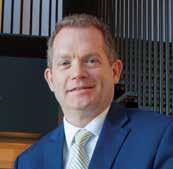
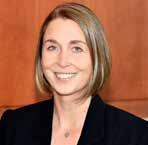
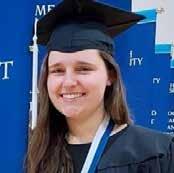
Pepper ’92, associate provost for graduate and professional studies and university partner ships. “We’ll get you ready, we’ll have a seat.”
ONLINE CLASSES
Whether you’re a dual enrolled high school student or a traditional college student, online classes are a great way to satisfy gen eral education requirements for almost anyone attending Messiah. While Messiah always offered some online classes, the number of classes increased greatly as a
dual enrollment experience is that it prepared me well for online courses during the COVID lockdowns, since I took four Messiah courses online during summers for dual enrollment.”
Dual enrollment allows high school stu dents to build on success.
“When a student does well in a dual enroll ment course, they build on their belief that they can complete college-level work. Often, this means that they are less overwhelmed right away in the fall of their first year with managing college-level courses and figuring out expectations at the college-level,” said Rob
result of the pandemic.
“We try to offer at least one online section in the most general ed categories, though typi cally not in areas with hands-on requirements like the lab sciences,” said Alison Noble, in terim provost. “Online actually worked really well for our language courses. Languages got a big bump in the online space, since there are no masks via Zoom.”
Student athletes especially can ben efit from the flexibility that online courses offer during a particular sports season. As a student tries to put together a complicated class schedule around practices and games, an online class can be the answer. For example, a full semes ter, in-person class lasts 16 weeks, but an online spring semester class is typically only eight weeks.
“If a student is competing during the first half of the semester, they are look ing for flexibility and can take the 8-week online course during the second half of the semester, and still maintain full-time status as a student. They can get an in-per son, residential education with an occasional online class. It’s asyn chronous, so they can manage the competing demands on their time.”
“
The credits I earned through dual enrollment allowed me to graduate in three years, rather than four.”
— Cori Galbraith ’22, a human development and family science major
Rob Pepper ’92, associate provost for graduate and professional studies and university partnerships
Cori Galbraith ’22
MESSIAH UNIVERSITY • THE BRIDGE • VOLUME 2 2022 | 15
Alison Noble, interim provost
MESSIAH UNIVERSITY LAUNCHES PARTNERSHIP WITH CAMP CHO-YEH FOR COMPASS GAP YEAR PROGRAM
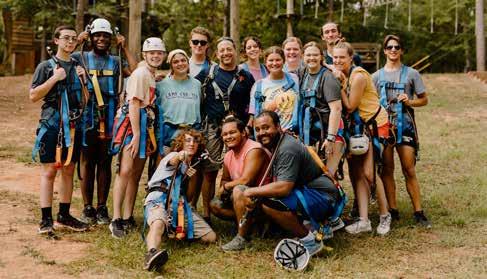
Messiah University is excited to launch a new partnership with Camp Cho-Yeh’s Compass Gap Year Program, an intensive 9-month discipleship program, uniquely created to equip students for the chal lenges of life. Through an integration of spiritual development, leadership activities and community living, Compass students will deepen their faith, forge character and learn what it means to passionately follow Christ.
This program will allow students to earn 12 transferable college credits during their 9-month gap year at Cho-Yeh. Each semester, the group will participate in two online courses, receiving instruction in Communication, Biblical Survey, Biblical Theology, and Family Dynamics. When students complete the Compass program, they will have a strong start to their college career.
If Compass students continue their ed ucation at Messiah University, they will re ceive a $2,500 scholarship each year. The program offers this benefit with a goal to encourage students to continue in biblical education, provide Christian colleges with quality students and advance discipleship. In addition to leadership training and their
academic studies, students participating in Compass’s Gap Year Program will also develop skills like resume building, conflict resolution, public speaking, budgeting, personal finance and more.
“We are so pleased to be able to offer college courses and scholarships for Compass students as they explore their calling,” said John Chopka, vice president for enrollment management at Messiah University. “Our hope is that a number of them will feel poised to become de gree-seeking students upon completion of the program and see Messiah University as a natural next step!”
“We are thrilled to partner with Messiah University, and we strongly believe that this partnership will deeply enrich our Compass students’ experience.” added Garret Larsen ’00, president and CEO of Camp Cho-Yeh and current member of Messiah’s Board of Trustees.
The gap-year program is based out of Livingston, Texas. –Staff report
LEARN MORE ABOUT THE PARTNERSHIP: MESSIAH.EDU/CHOYEH
POST-BACC OPTION
Those who already have a bachelor’s degree in any discipline can take classes at Messiah to become a Pennsylvania certified teacher.
“An exciting aspect of working with postbacc teacher certification candidates is the wide range of experiences that brought them to pursue teaching when they originally thought they wanted to do something else,” said Jennifer Fisler ’94, dean of the School of Graduate and Professional Studies. “Every situation is unique, so we tailor our programs to work with students’ needs and goals.”
Courses are offered primarily online with an in-person summer intensive. Students then have the opportunity to complete field experiences and student teaching in a school setting near one’s home.
“We focus on helping our students become excellent teachers. They come to us with content knowledge and life experience. We help them bring that into a classroom of their own,” said Fisler.
Since most of the classes are offered at the graduate level, students can pursue the full master’s degree by completing just a few more courses. “The teacher shortage across the country is well-documented. Our post-bacc certification program is one way we’re work ing with students and schools to try to address it,” said Fisler.
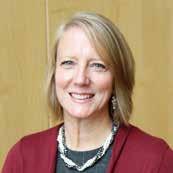 Fisler ’94, dean of the School of Graduate and Professional Studies
Fisler ’94, dean of the School of Graduate and Professional Studies
MESSIAH EXPERIENCE
ALYSSA CHILTON
16 | VOLUME 2 2022 • THE BRIDGE • MESSIAH UNIVERSITY
Jennifer
ACCELERATED PROGRAMS
If a high school student is certain about majoring in occupational therapy or athletic training, he/she can opt for an accelerated program, reducing the stress and uncertainty of standardized tests and applications.
“You lock in at 18 and say I’m going to Messiah for this long and I’m going to walk away with my bachelor’s and my master’s,” said Pepper.
Much the same way that dual enrollment courses can count for credit in both high school and college, accelerated programs al low students to earn credits in undergraduate and graduate school simultaneously.
In the accelerated program for Master of Occupational Therapy (MOT), students pick one of two undergraduate majors: applied health sciences or psychology. In the Master of Science in Athletic Training, students choose applied health science as an under graduate major.
“In Pennsylvania, you need to have 30 standalone credits beyond the 120 to get a master’s degree. Since our master’s in OT is much more than 30, in your senior year [of undergraduate work], you start taking your graduate courses,” said Pepper. “They count for the undergraduate degree. You earn an undergraduate degree and seamlessly contin ue on to complete the graduate degree course work. Programs like this typically reduce the time to completion by 1 year.”
In other words, the first 30 credits of the master’s degree count toward the bachelor’s degree, too. The degree is accelerated in that one doesn’t have to get the 120 credits for a bachelor’s and then earn an extra 60-80 cred its for a master’s.
What if a student realizes halfway through that he’s not cut out for this program?
“You can still earn an undergraduate de gree in the curriculum that we have designed (psychology or applied health science) or change your major,” said Pepper. “There are multiple on-ramps and off-ramps within the Messiah degree offerings.”
EARLY ASSURANCE
Students who want to be physical or occu pational therapists can opt for the Doctor of Physical Therapist Early Assurance Program (DPT EAP) or Master of Occupational Therapy Early Assurance Program (MOT EAP). These programs provide flexibility as students can complete an undergraduate
degree in any major. As long as they success fully complete the program pre-requisites, they are admitted into either the DPT or MOT program.
“When you’re doing the early assurance program, you know there are certain bench marks along the way. As long as you meet them, you can have a full-fledged, four-year experience, and you’re assured a seat in the program. Admittance to these programs is very competitive, and the EAP provides
students with some flexibility with what they want to study [as undergraduates]. They can still play a sport, study abroad, participate in the arts or even complete a major with a minor,” said Pepper.
Today’s Messiah students have no shortage of degree options. They are limited only by their imagination in charting their university experience.
“ There are multiple on-ramps and off-ramps within the Messiah degree offerings.”
Rob Pepper ’92, associate provost for graduate and professional studies and university partnerships, discussing the many ways someone can get a degree at Messiah University
MESSIAH UNIVERSITY • THE BRIDGE • VOLUME 2 2022 | 17
Messiah University celebrated its 113th Undergraduate Commencement May 7, conferring degrees on 563 graduating seniors in Brubaker Auditorium.
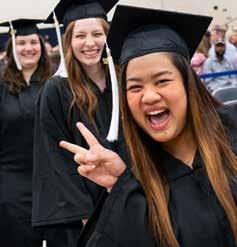

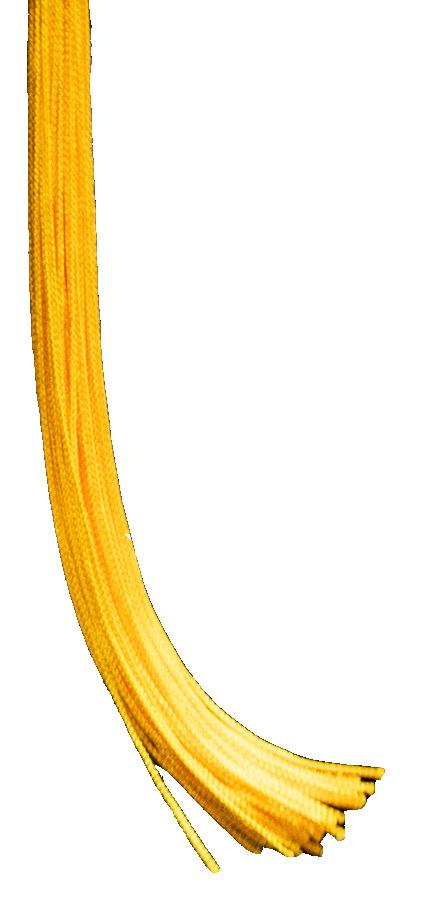
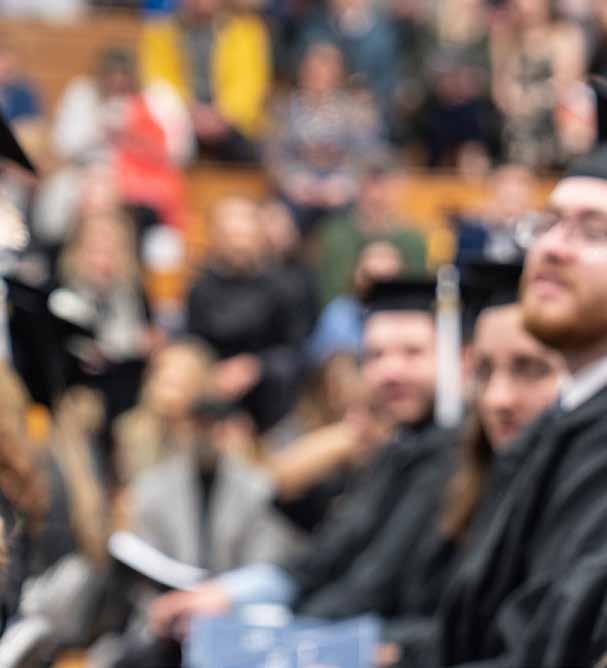
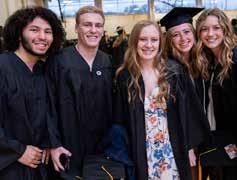
COMMENCEMENT Undergraduate
“
Though you are stepping into a difficult moment in our nation; when I look out at your faces and remember your stories, your questions, your service, your accomplishments and your positive contributions to the Messiah University community, I am hopeful. May your grace-filled presence in the world—in your homes, churches, communities and workplaces—be a beautiful testament to your Messiah University education, and even more importantly, a witness to the Jesus of the Gospels. May He sustain and guide you now and forevermore. ”
FEATURE STORY
18 | VOLUME 2 2022 • THE BRIDGE • MESSIAH UNIVERSITY
– President Kim Phipps’ charge to the new graduates
COMMENCEMENT
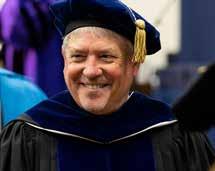
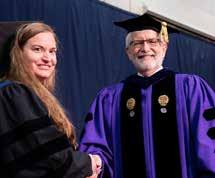
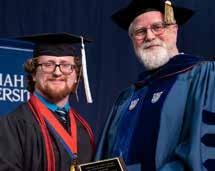
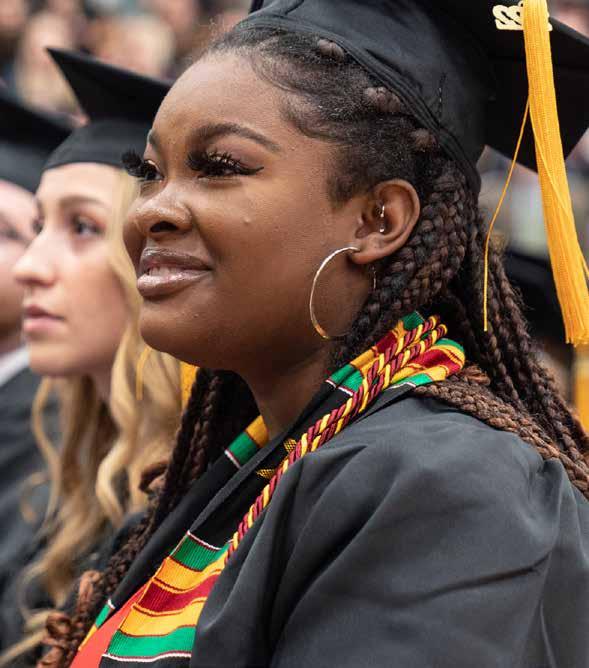
GOULD PHOTOGRAPHY
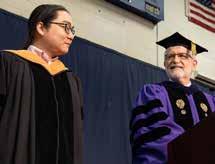 NICK
Dr. Robert and Marilyn Smith Award for Outstanding Teaching: Jason Renn, assistant professor of politics
Outstanding Cocurricular Educator Award: Amy Slody, director of the Academic Success Center
NICK
Dr. Robert and Marilyn Smith Award for Outstanding Teaching: Jason Renn, assistant professor of politics
Outstanding Cocurricular Educator Award: Amy Slody, director of the Academic Success Center
SPECIAL RECOGNITIONS
Donald and Anna Zook Alumni Merit Award: Matt Jenkins ’22, student body president
MESSIAH UNIVERSITY • THE BRIDGE • VOLUME 2 2022 | 19
Dr. Robert and Marilyn Smith Award for Outstanding Teaching: David Weaver-Zercher, professor of American religious history
Rising
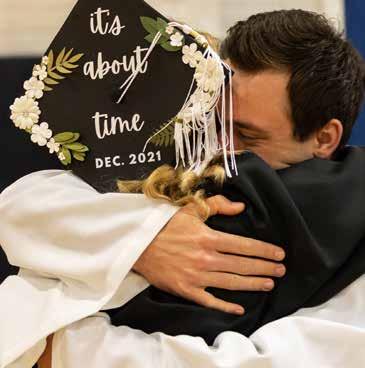
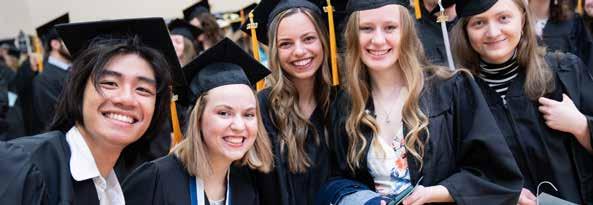
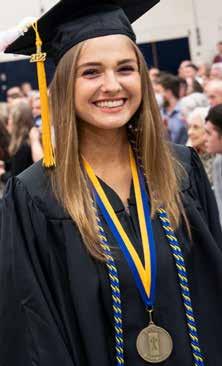
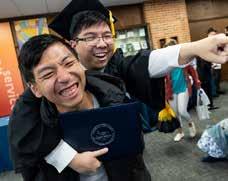
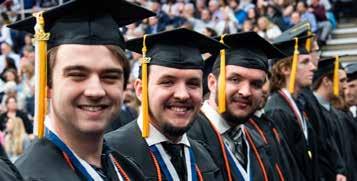
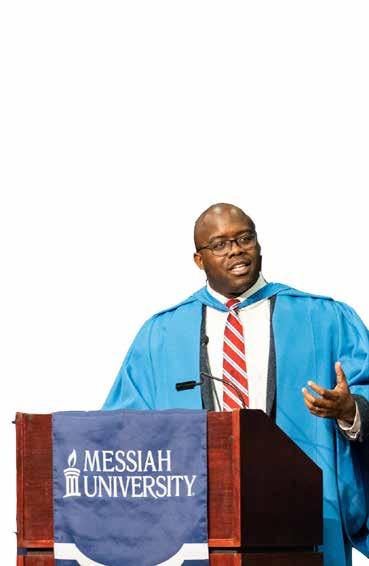
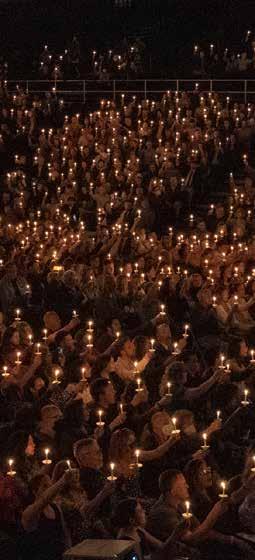
2022 COMMENCEMENT
20 | VOLUME 2 2022 • THE BRIDGE • MESSIAH UNIVERSITY
Provost Randall Basinger retires after four decades to the occasion

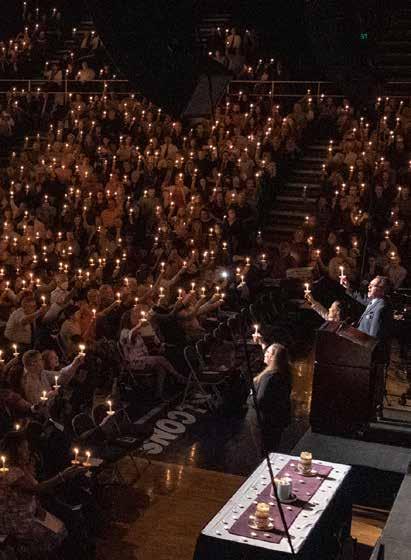
Provost Randall G. Basinger received an honorary Doctor of Arts and Humane Letters. He retired in June after serving at Messiah for 39 years. Here’s an excerpt of the citation President Phipps read upon conferral of his honorary degree: “Today, we honor your four decades of service to Messiah University. I wholeheartedly believe that the world needs more Messiah graduates and, because you fully embody Messiah’s missional commitment to service, leadership and reconciliation, it is befitting that you, too, join the ranks of Messiah graduates today as you preside over your final commencement as Provost. Your inspired teaching and unwav ering commitment to faith and character development in the academy have left an indelible mark on this institution and on the landscape of Christian higher education.”
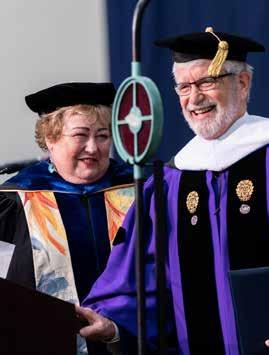
“Your inspired teaching and unwavering commitment to faith and character development in the academy have left an indelible mark on this institution and on the landscape of Christian higher education.”
– President
Phipps
Esau McCaulley, Ph.D., assistant professor of New Testament at Wheaton College, served as the Undergraduate Commencement speaker.
President Phipps bestows honorary Doctor of Arts and Humane Letters upon him at Commencement ceremony
MESSIAH UNIVERSITY • THE BRIDGE • VOLUME 2 2022 | 21
SENIOR SPOTLIGHTS
NURSING
CASSIDY HOFFMAN ’22 WILLIAMSPORT, PENNSYLVANIA
Nursing major Cassidy Hoffman ’22 grew up around hospitals, because his mom is a nurse.
“Early on, I knew nursing was what I want ed to do,” he said.
Growing up near Williamsport, he learned about Messiah University by attending summer soccer camps as a child. That led to enrolling as a student.
“I loved the community,” he said. “For me, there was no other choice than Messiah.”
He said, through a lot of discipline, he was able to major in nursing while also competing in track and cross-country.
BUSINESS ADMINISTRATION
NATHAN NCUBE ’22 BULAWAYO, ZIMBABWE
As a business administration major, Nathan Ncube ’22 had no trouble finding a job immediately after graduation. He works as a business development specialist at SEI Investments outside Philadelphia in Oaks, Pennsylvania.
“I love it,” he said. “I live 30 minutes away. It’s a beautiful town.”
But, he first had to find a place of belong ing.
After coming to the U.S. from Bulawayo, Zimbabwe, when he was 15, he went to high school in Mt. Joy, Pennsylvania.
“It was quite an experience,” he said of the transition. “I’m still adjusting to a lot of things to this day.”
Two people brought him to Messiah-Dereck Kamwesa, former assistant director of admissions, and Dwayne Safer, associate professor of finance.
“Dereck Kamwesa recruited me to come to Messiah,” said Ncube, “and the first time I vis ited, I met Dwayne Safer at the open house. He was telling me a whole lot about Messiah’s business program.”
When Ncube returned to campus for accepted student preview day, Safer remem bered his name. That sealed his decision to at tend Messiah. His first year on campus, how ever, he struggled with finding community
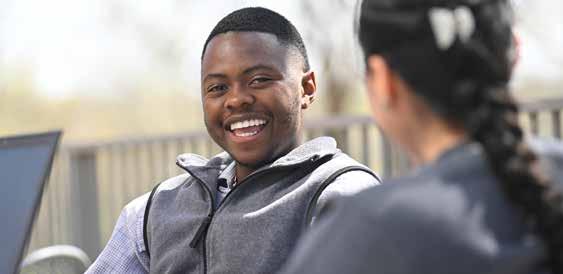
and a sense of belonging.
“I was still going to my classes and playing on the men’s club soccer team, “ he conceded, “but my sophomore year, I joined a good number of clubs.”
Through the Multicultural Council, the African Student Union and the Investment Club, he found a community. In his junior year, he became the president of the African Student Union and then, his senior year, the chair of the Multicultural Council.
He also found a mentor in Andy Babyak, Department of Business chair and associate professor of management.
“Nathan became a part of our family during his first-year at Messiah when he came over for Thanksgiving and played soccer with our boys in the backyard,” said Babyak. “It has been amazing to see his growth from a first-year student to a confident and faithful professional who is launching his career.”
For students considering a career in busi ness, Ncube highly recommends Messiah’s program.
“They hold us to a standard as working professionals,” said Ncube. “The honest, constructive criticism prepares you for the real world.”
“I had a great coaching staff who worked with me and really made sure I was getting a great education,” he said. “You can miss a practice here and there if you’re struggling in a class.”
He credits the nursing professors with preparing him to do his best—and letting him know when he could do better.
“A professor pulled me aside one time and said, ‘I know you didn’t do great on this test, but you are going to be a great nurse. Buckle down and study.’ After that, I was an A stu dent. Nursing is not easy program. Messiah prepares you so well, and the professors are great, God-fearing people who are invested in you.”
Much like the professors who invested in him, Hoffman wanted to fellow nursing stu dents. As a senior, he worked in the Learning Center tutoring other students, two hours a night twice a week. He was permitted to tutor in any nursing course he’d already taken.
“I wanted it to be nursing specific, because I feel like there is a need there. In the soph omore and junior years, the content gets so difficult. We worked diligently,” he said.
Through an externship last summer, he worked in the pediatric intensive care unit (PICU) at Penn State Health Milton S. Hershey Medical Center. In August, he start ed working there as a full-time employee.
“Being a Messiah nurse gets you an inter view,” he said.
Since starting on the unit, he says he real izes how well Messiah prepared him for the demands that nursing puts on the mind and body, including how to manage stress.
2022 COMMENCEMENT
22 | VOLUME 2 2022 • THE BRIDGE • MESSIAH UNIVERSITY
“A professor pulled me aside one time and said, ‘I know you didn’t do great on this test, but you are going to be a great nurse. Buckle down and study.’ After that, I was an A student. Nursing is not an easy program. Messiah prepares you so well, and the professors are great, God-fearing people who are invested in you.”
– Cassidy Hoffman ’22
“I’ve been in the floor for roughly three weeks and have rapidly progressed through a difficult orientation process,” said Hoffman. “I have the joy of working with a great staff whose sole focus is on health and safety of all the kids who come through our doors. There is a sacredness to the work we do, bringing kids on death’s door back to a state of health. There have been good days and bad days, patients who test your resolve and others that fill your soul. I could not be more grateful for the opportunities that God has given me to continue his work and perusing his kingdom here on earth!”
—Molly McKim ’23 and Anna Seip
MUSIC EDUCATION
HANNAH WELLER ’22 GROVE CITY, PENNSYLVANIA
When your parents are music education ma jors, you might just become a music education major yourself.
“I wouldn’t have wanted to grow up any other way,” said Hannah Weller ’22. “It’s a filter through which I live my life.”
Winner of the Kuhlman competition and the Presser Award while on campus, she recently began a master’s in clarinet perfor mance at the University of North Texas, a premier music school.
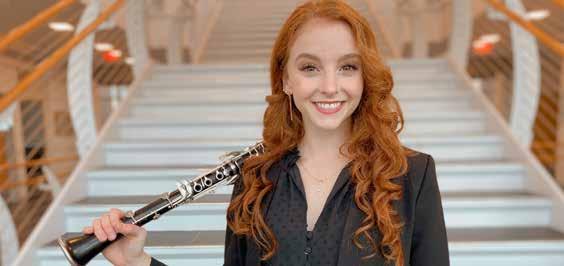
“I want to spend some time on personal artistry. It’s important for music teachers to be performers,” she said. “I will learn more than anybody would ever want to know about clarinet.”
While studying for her master’s, she’s also teaching private clarinet and saxophone les sons at an independent school district.
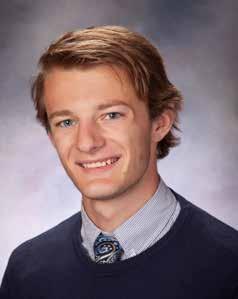
She credits two special teachers with guid ing her Messiah journey: adjunct Stephanie Cramer and Tim Dixon, professor of music.
After her first solo performance, Weller found herself rattled and not having a good time. She was also stressed about auditioning for graduate schools. Cramer helped Weller with the stage fright.
“She said, first of all, it’s completely normal to feel this way. She helped me dig into the science of nervousness,” explained Weller. “These are things I can do to counteract that. Breathing exercises, grounding, the power pose. She also said you need to step out in faith. That’s something I carried with me during the rest of my auditions.”
She also received a lot of practical advice from Dixon along the way when figuring out next steps for graduate school.
“He said the path is between you and God. His advice was very empowering,” she said. “They’re both such godly, faithful people. They continue to be wonderful to me. I look forward to being their colleague.”
The respect is mutual.
“She is a walking advertisement for a Messiah University education–talented, hard-working, conscientious and kind,” said Dixon. “She puts her whole heart and energy into everything she does and raises the bar for everyone in the room.”
Weller says Messiah University prepared her to be more than a music teacher, training her to be a Christian educator who can be an intentional professional in her field.
“The University of North Texas is one of the top music schools in the country. I’m daunted by that,” she said. “I wouldn’t be there if I had gone to any other university besides Messiah. I’m very grateful to be an alum.”
—Molly McKim ’23 and Anna Seip
Weller traveled with the Messiah University Concert Choir and Chamber Singers to Spain to perform works by Spanish compos ers in Madrid, Salamanca and Santiago de Compostela in May. The group also hiked along the Camino de Santiago, a network of pilgrim routes across Europe.
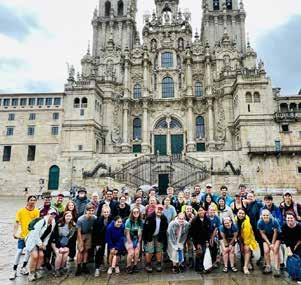
MESSIAH UNIVERSITY • THE BRIDGE • VOLUME 2 2022 | 23
Graduate COMMENCEMENT

At Brubaker Auditorium, the School of Graduate Studies honored the Class of 2022, where 281 graduates received their master’s and doctorate degrees May 14. This milestone event included the first cohort to graduate from Messiah’s Doctor of Physical Therapy program.
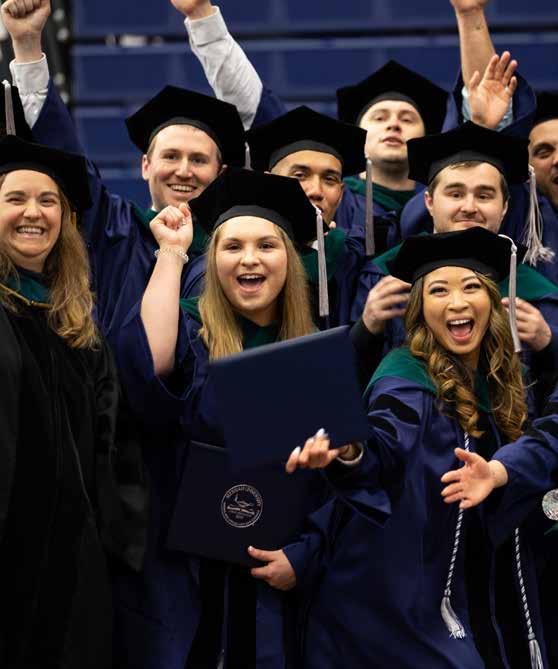
Quincy Hilliard , Ph.D., composer in residence and the Heymann Endowed Professor of Music at the University of Louisiana served as the Graduate Commencement speaker.

2022 COMMENCEMENT
CEREMONY HIGHTLIGHTS
24 | VOLUME 2 2022 • THE BRIDGE • MESSIAH UNIVERSITY
Leanne Rutt Assistant professor of Occupational Therapy Harry and Nancy Preis Outstanding Graduate Teaching Award
Here’s what a few of them have to say:
“I chose Messiah University because of the great impression the professors had on me during my interview. This is a great threeyear program with very qualified professors and a beautiful graduate campus. I would tell a person pursuing a DPT that Messiah is a great choice. The quality of education at the Messiah DPT program is top notch.”
–Daniel Codrington, DPT ’22
“ I chose Messiah because I cherished my undergraduate education here so much that, when I heard they were starting a physical therapy program, I knew I wanted to apply. Messiah provided a program where I could learn from exceptional clinicians, integrate my faith and serve the community. I would recommend it to anyone.”
–Andrew Eyster, ’16, DPT ’22
“I choose the Messiah DPT program due to its small student-to-teacher ratio. I came from a big undergraduate university and wanted the opportunity to make valuable connections with my professors and students. Physical therapists are, in part, great teachers because they provide patients the tools they need to take control of their lives again.
–Ruchita Patel, DPT ’22
“The professors were not only knowledgeable, but they truly cared for us and took into consideration our learning styles. One of the many ways they demonstrated genuine care for us was when it was the time before we all went out to our full-time clinicals. Our professors wrote us individualized handwritten prayers and encouragements that helped us get through those first-day jitters. Their constant support for us was evident throughout the entire duration of the program.”
–Josannah Rosario, DPT ’22
RACHEL JACKSON, M.M. ’22
When the pandemic hit, Rachel Jackson, M.M. ’22 found hope in a Messiah graduate program.

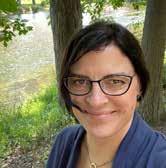
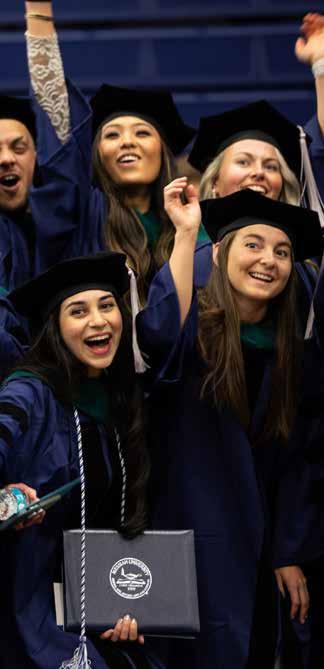
Beginning a Master of Music only two months after the pandemic began, she says there was a collective depression in the music community. “For me, a side-effect of the pan demic was a real need for refocus on some thing positive. This master’s program fulfilled that need,” she said.
When initially searching for a master’s program, she says she looked for a place that would take her to the next level in choral conducting while maintaining a full-time job. “Messiah’s summer intensives combined with the incredibly interactive online fall and spring classes seemed like a perfect fit. The class sizes were small, so there was potential for a real connection,” she said.
Jackson especially connected with Rachel Cornacchio, professor of music. “She is a fabulous instructor and conductor. She is pro fessional, competent and yet encouraging and approachable,” she said.
Originally, Jackson held off on getting her degree for four years. Her only regret is not starting sooner. She said, “I have always been pro-active with personal growth and research, but that could not hold a candle to the profes sional instruction I received from the wonder ful choral-conducting team at Messiah. I have worked in education as well as in the church music environment. This program is a great fit for both worlds. They seek diversity in faculty, students and also look for it in repertoire.”
In Sacramento, California, she works as a full-time conductor at a Presbyterian church, where she leads a choral program and instrumental music academy, focused on music education for the diverse community. She especially enjoys researching for and conducting the Christmas concert, featuring a full orchestra and community choir. “Musical environments are one of the best places where everyone can come together to learn, celebrate, love, mourn or worship, no matter what age, background or culture,” she said.
Our first DPT cohort just graduated!
MUSIC MAJOR
MESSIAH UNIVERSITY • THE BRIDGE • VOLUME 2 2022 | 25
—Molly McKim ‘23 and Anna Seip
EXEC DIRECTOR BRINGS GLOBAL PERSPECTIVE TO MENTORING AT NYU
The Carnegie Corporation of New York recently named Fabienne Doucet ’95 one of its “Great Immigrants” of 2022.
Born in Spain, raised in Haiti and immigrating to the U.S. at age 10, Doucet finds herself in the company of 34 honorees, includ ing TV host Padma Lakshmi.
With a long career in ac ademia, she now works as the executive director of the NYU Metropolitan Center for Research on Equity and the Transformation of Schools and as an associate professor of early childhood education and urban education at the NYU Steinhardt School of Culture, Education and Human Development. She began the director position in January and is working to make it her own, with an emphasis on mentorship.
“Mentorship is something that I find as a core identity for me,” she said. “I got this advice from a mentor when I was trying to decide whether or not to take this quest to lead Metro. What does a center director even do? He said, ‘You get to decide. That’s the beauty.’ I said to him, ‘I really just want to mentor people,’ and he said, ‘Then that’s what you’ll do. That’s what you’ll turn this position into.’”
So, she has put her energy into figuring out a way to continue to invest in the developing careers of researchers, policy-makers and those in government.
“Just thinking about ways that I can provide the setting and the
structures and the supports to be able to help these folks grow their careers and move them in the di rection they want. That’s a really high priority for me,” she said.
After graduating with a degree in behavioral science at Messiah, she received her master’s and Ph.D. in human development and family studies at the University of North Carolina at Greensboro.
“My major was behavioral science,” she said. “I ended up creating a major in child develop ment and family studies by doing my child development classes at Philly [Campus] and the fam ily studies on [the Grantham] campus. The power and influence of mentors can’t be overstated. I’m always reflecting on how I wouldn’t be where I am now without this person doing this and this person doing that. That’s probably why I value mentorship so much—because how much it has benefited me.”
She says being a student of color was not always easy, but she found a community that support ed her along with encouraging faculty and staff.
“I am happy to see Messiah keeps on evolving in its journey for all of us,” she said. “You’re not going to get it right all the time.”
As she makes her way through her first year in her new role, it’s not lost on her that she’s the first Black woman to lead the Steinhardt Research Center.

“On one hand, I think it’s an amazing opportunity, and I really want to make the best of it. Also, it’s disappointing that it’s 2022 and it’s the first time a Black woman is leading a research cen ter. I hope that at least by doing this, it opens the door for other Black women to lead,” she said.
Molly McKim ’23 and Anna Seip
“
THE POWER AND INFLUENCE OF MENTORS CAN’T BE OVERSTATED. I’M ALWAYS REFLECTING ON HOW I WOULDN’T BE WHERE I AM NOW WITHOUT THIS PERSON DOING THIS AND THIS PERSON DOING THAT. THAT’S PROBABLY WHY I VALUE MENTORSHIP SO MUCH—BECAUSE HOW MUCH IT HAS BENEFITED ME”
FABIENNE DOUCET ’95
‘I really just want to mentor people.’
OUR ALUMNI NEWS
LUDWIG BORGELLA
’95 26 | VOLUME 2 2022 • THE BRIDGE • MESSIAH UNIVERSITY
—Fabienne Doucet
GETTING CREDIT FOR KAYAKING
DPT STUDENT TOURED GREENLAND FOR ELI
The word “kayak” comes from the Greenlandic word “qajaq.”

Nathaniel Apgar ’17 began kayaking at 18 months old, riding in the lap of his father.

So, when the chance to create his own intercultural experience to satisfy Messiah’s Experiential Learning Initiative (ELI) credit arose, he went back to his roots.
Students can satisfy their ELI credit through a “career applica tion” that is contextualized for an external audience relevant to the students’ future goals.
“The path to my passion and
my degree field did not line up, so I asked my advisor if I could do anything to make them cross,” explained Apgar, an applied health science major.
He partnered with Qajaq USA, an organization that seeks to preserve the traditional culture of those living in the Artic. They needed an athlete to compete in the annual Greenland National Qajaq Championship and sent him a plane ticket. In July of 2017, he set off for Aasiaat, Greenland.
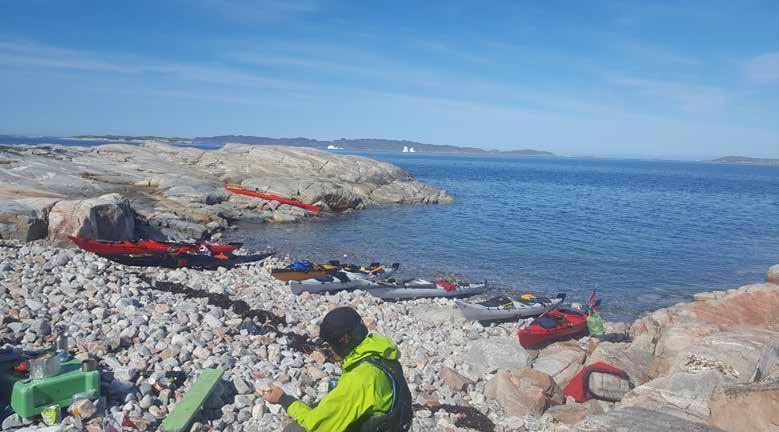
He spent four weeks competing in races and then kayaking the coast of Aasiaat—about 12-13 miles in diameter.
WHAT’S HE DOING NOW?
Recently married, he and his wife spent their honeymoon hiking the Grand Canyon’s South Rim and other areas of Arizona.
He’s now in his third year of
Messiah’s Doctor of Physical Therapy program.
“I’m on a clinical rotation in Harrisburg now, so I’ve been pretty busy,” he said.
He says he still tries to get on the water, in the woods and in the mountains as much as he can.
“Messiah gave me an awesome opportunity to purse my inter ests,” he said, “If you are thinking
about an ELI or cross-cultural experience, do it! Sure, we all go to school to get a job, but don’t forget--as my poetry professor used to say--’Job is a Gallic word for lump.’ Take your lumps, but don’t forget to do something that makes you come alive!”
Molly McKim ’23
NATHANIEL APGAR ’17
PHOTOS COURTESY OF NATHANIAL APGAR ’17
Kayakers follow “the rule of 120.” If the air and the water temp is less than 120, one needs special Arctic gear— wet suit, dry suit, thermal layers, etc.— to help prevent hypothermia. MESSIAH UNIVERSITY • THE BRIDGE • VOLUME 2 2022 | 27
Nathaniel Apgar ’17, who kayaked along Greenland as an undergrad, is in his third of the DPT program.
FUN FACT
LUKO ’12
IBI alumna finds her niche in corporate relationship-building
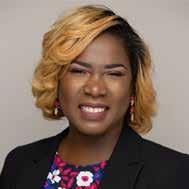
When COVID-19 hit, Rosette Luko ’12 reevaluated her life, as many of us did. She already had climbed the corporate ladder at PepsiCo, worked overseas as a French auditor and as a product manager for quality assurance for the U.S. Food and Drug Administration.
“Every five years, I asked myself, ‘Am I changing? Am I moving? Am I stagnating?’” she said.
She now works as a product mar keting manager at Vallen Distribution Inc. in Belmont, North Carolina.
“Vallen is a leading pro vider of indirect industrial supplies, which are all the mate rials that manufacturing plants need to function,” she said. “I just came from BMW yesterday. BMW makes cars. To make cars, people need gloves. BMW makes cars, but they don’t make gloves. We work with vendors. Our company facilitates that from a service perspective.”
MESSIAH PREPARED HER
She came to Messiah as an international student from the Democratic Republic of Congo whose family had recently moved to Pennsylvania. An internation al business major with a minor in French, she was one of the first students to participate in the International Business Institute
program.
“That gave me a sense of what the international market was like,” she said. “You have that perspective of how business works in the U.S., but you get a different perspective in Europe. IBI gives you that different worl dview.”
CALLED TO BUSINESS
Luko credits her Messiah pro fessors with investing in the international students on campus, and the care her teachers showed informs the work she does now. They didn’t just tell her she mattered, they showed her. As a result, she lives out that relation ship-building work ethnic in her interac tions with vendors.
“Think of how many manu facturing plants we have across the U.S. I can’t go to every single one,” she explained. “It’s my job to connect with vendors. I work with the salespeople who work with the end users. That’s how you make relationships.”
She says her Messiah experi ence also helped her navigate the corporate world from a Christian perspective. “I’m not a mission ary, but I’m called to the business world. I take my faith with me, and people see something differ ent in me. I have that faith-based mindset to ask, ‘This is business, but, ethically, is this right?’”
–Anna Seip
IN MEMORIAM
Galen Oakes
1930-2022
Galen M. Oakes Sr. ’48 (Messiah Academy) died July 18, 2022. He had an extraor dinary record of service at Messiah University. One of the most notable examples was through his tenure on the Board of Trustees, which began in 1963 at Upland College. After serving on Upland’s board for two years, Oakes began more than four de cades of service on the Messiah board. A total of 44 years of service on the Board of Trustees – with eight years as chairman of the board – is an unparalleled contribution to Messiah. From his faithful leadership of the
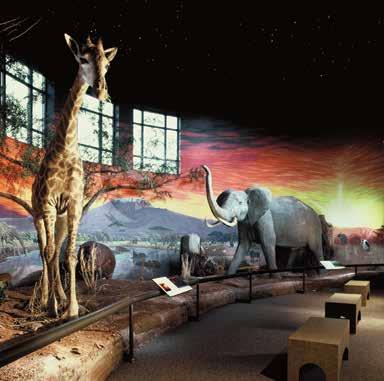
Operations Committee and the Board of Trustees to his generous donations to multiple projects to his support of the construction of the incredible Oakes Museum of Natural History on our campus, Galen used the many gifts God blessed him with to further bless Messiah University. It was our honor and privilege to name Galen and his late wife Boots ’49 (Messiah Academy) as recipients of the 2011 Engle Service Award, which recognizes those who have provided meritorious support to Messiah University. She faithfully served alongside her husband for all of those years, often tending to family issues so he was able to travel to Messiah. The Messiah community offers our love and sympathy to his widow Kathy and the entire Oakes family at the loss of this wonderful servant of the Lord. His legacy at Messiah will endure.

ALUMNI NEWS OUR
ROSETTE
I’M NOT A MISSIONARY, BUT I’M CALLED TO THE BUSINESS WORLD. I TAKE MY FAITH WITH ME.’
Galen M. Oakes Sr. ’48 (Messiah Academy) gave generously to campus projects, including the construction of the Oakes Museum of Natural History.
28 | VOLUME 2 2022 • THE BRIDGE • MESSIAH UNIVERSITY
COURTESY OF THE OAKES MUSEUM OF NATURAL HISTORY
First Alumni of Color Weekend brings fellowship, healing
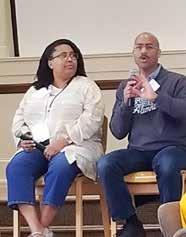
The Office of Diversity Affairs, in partnership with the Office of Alumni and Parent Relations, hosted a weekend gathering for Alumni of Color on April 22-24. The theme for the event, “Connecting the Generations,” provided an opportunity for alumni to connect with one an other, the University and current students. The weekend includ ed a concert, “Reconciliation in Sound,” by the Messiah
University Symphony Orchestra, featuring a special selection in honor of Rachel Flowers arranged by Jonathan Ragonese; a coffeehouse sponsored by the Multicultural Council; and a town hall meeting where President Kim Phipps had the opportunity to answer questions, listen and talk with alumni. Additionally, there were various panel sessions during which alumni learned more about
advance ments by the University in regard to inclusive excellence and reconciliation. The event concluded with an alumni-led gospel concert and worship service. More than 120 alumni attended the weekend along with their family and friends.
–Staff report
Get a head start on college while you’re still in high school and save money in the process!
Dual enrollment provides motivated high school juniors and seniors the opportunity to take college courses that may satisfy both high school and college credit requirements—in a learning environment where you can integrate your Christian faith with challenging academic inquiry.
Save on future college expenses
At Messiah University, we significantly discount (90 percent!) our cost per credit for dual-enrolled students only $150 per credit!
Strengthen your potential to graduate from college early Start your career or graduate school ahead of schedule while significantly lowering the expense of a traditional four-year degree. Messiah University is a regionally accredited university, so course credit transfers to other institutions.

Experience college life
Through dual enrollment, you will experience the same curriculum and learning environment as Messiah’s undergraduate students. Plus, you’ll be able to explore your various academic interests, which will help make choosing a major easier when the time comes.
Create a more flexible
schedule
Earning college credits in high school can free up more time in college for a job, athletics or other activities.
To learn more, visit messiah.edu/dual. MESSIAH UNIVERSITY • THE BRIDGE • VOLUME 2 2022 | 29
1980s
Norm Cole ’82 works as the assistant director of residence life at the Florida Institute of Technology in Melbourne, Fla.
Peter Greer ’83 co-wrote a book titled “The Gift of Disillusionment,” released in April.
Susan (Kreider) Getty ’84 published an anthology of poetry, “A Cup of Midnight Tea,” which is available on Amazon. She is the owner of Stony Run Art Studio in Dillsburg, Pa.
2000s
Jason Poterfield ’05 published a new book, “Fight Like Jesus,” with HeraldPR in February.
Adam Tarantino ’05 works as the director of compli ance at BAR Financial in Mechanicsburg, Pa.
Rachel Brady ’06 and her husband announce the birth of McKenna Mae, Nov. 10, 2021. She is pursuing a Ph.D. in cell and molecular biology at Colorado State University and completed her residency in oncology at the University of California-Davis Veterinary School.
Kristen Orr ’06 works as the director of student minis tries at Bel Air Presbyterian Church in Los Angeles. She and her husband Andrew ’07 also announce the birth of Ruth, Sept. 15, 2021.
Dannah Rhoads ’06 and husband Michael announce the birth of Lydia, Jan. 6, 2022.
Adrienne Kuhlengel ’06 and Eric Weber ’07 married Sept. 17, 2021, in Elizabethtown, Pa.
Lindsay (DeVries) Herndon ’07 works as a nurse at UVA’s Midlife Health Clinic. She and husband Ivan announce the birth of Alma, Dec. 28, 2021.
Brenda (Pritts) Smith ’07 and her husband Nicholas announce the birth of Alistair, Jan. 11, 2022.
Michelle Hollenbach ’08 and husband Nathan announce the birth of Holiver, Dec. 19, 2021.
Ginny (Heidel) Masterson ’08 and husband Drew announce the birth of Owen, Sept. 9, 2021.
2010s
Jessica (Fink) Thier ’11 and husband John announce the birth of Mary, Sept. 11, 2021.
Jason Thompson ’11 works at Pella Windows and Doors in Harrisburg, Pa.
Anne Chase ’12 and Jason Ruiz married in Philadelphia, Pa., May 8, 2022.
Heather Barnhart-Hall ’13 works as an assistant gener al manager for Essex House Independent Senior Living Community.

CLASSNOTES OUR
We are so grateful for Joyce and all of the other faithful supporters of Messiah University’s amazing students. TO LEARN HOW YOU CAN CREATE AN ENDOWED SCHOLARSHIP, CONTACT THE HERITAGE SOCIETY TEAM 717-796-5051 • heritagesociety@messiah.edu Thanks to Messiah’s current scholarship 100% matching program, endowed scholarships can be started with as little as $12,500. Endowed Funds Please note that endowments may be funded now through gifts of cash or securities, or later through bequests, charitable gift annuities, trusts, and/or insurance policies or IRAs. Endowed funds are often named for the person or family who establishes the fund, or for someone they wish to honor or memorialize. In addition, you may tailor the purpose of your endowed fund to benefit a specific area of interest. Donors also enjoy opportunities to correspond and meet with the student or students who benefit from their endowed fund. Meet Joyce Wert, devoted wife & mother, accomplished organist and faithful supporter of Messiah University! Joyce created the Joyce M. Heim Wert Organ Endowed Scholarship Fund to honor the memory of her beloved son Kevin, who passed away suddenly from cardiac arrest at age 45 in 2015. MESSIAH.EDU/CREATEALEGACY 30 | VOLUME 2 2022 • THE BRIDGE • MESSIAH UNIVERSITY
Liesl (Nafziger) Knauer ’13 and husband Jeremy announce the birth of Darian, Sept. 29, 2021.
Derick Esch ’14 works as the video production super visor for Sight and Sound Theatres.
Jenna Capobianco ’15 works as a surgical resident at Wyckoff Heights Medical Center in Brooklyn, N.Y. She graduated magna cum laude from St. George’s University School of Medicine, earning a medical doctorate.

Tovah Wilson ’15, M.A. ’20 works as the director of annual giving and donor communication at Messiah.
Elizabeth Gallo ’16 works as the business development associate and marketing manager at American Track in Boiling Springs, Pa. She serves on the 2022-2024 board of the Cumberland County Council of Republican Women as a first vice president and cor responding secretary.
Sarah (Hunt) Ganung ’15 and husband Brock announced the birth of Hallie Grace, Feb. 22, 2022.
Kathleen Hahn ’16 works as an outpatient dietitian for Providence Medical Center in Portland, Ore. She recently completed a master’s in food systems and society (FSS), a program that focuses on social justice issues through the lens of class, race and gender, at Oregon Health and Science University.
Brooklyn Ford ’17 works as the lead exhibit maintenance artist at Answers in Genesis.
2020s
Erin Brenneman ’20 started graduate school at Villanova University and works for the bridge design firm Modjeski and Masters in Mechanicsburg, Pa.
Ellen Diehl ’21 started her second year in the MFA acting program at Case Western Reserve University, one of the top programs in the country.
David Brezina ’22 recently accepted a role as the asso ciate/youth pastor at Grace Evangelical Congregational Church in Schuylkill Haven, Pa.
Caitie Buswell ’22 started her first year in the MFA theatre design program at Northern Illinois University.
Matt Collman ’22 works as an analyst with PFM Asset Management, specializing in public finance.
Rachel Switzer ’22 joined the Ad Deum Dance Company in Houston for the ’22-’23 season.
APPLY TODAY 717-796-5061 messiah.edu/gradnursing Online | Flexible | Affordable Messiah’s MSN and DNP degree programs are accredited by the Commission on Collegiate Nursing Education Advance your nursing career Experience the academic distinction of a nationally ranked Christian university. In the rapidly changing world of health care, skilled nurses with an advanced nursing degree are in high demand. Advance your career as a family nurse practitioner or in nursing leadership with a Doctor of Nursing Practice degree or as a nurse administrator or nurse educator with a Master of Science in Nursing degree from Messiah University. Our program offers: • Courses taught by supportive faculty from a Christian faith perspective • Deferred tuition option with no out-of-pocket tuition fees • Small class sizes • Flexible start dates • Online coursework MESSIAH UNIVERSITY • THE BRIDGE • VOLUME 2 2022 | 31
IN MEMORIAM
Ron Sider

1939-2022
“If God’s Word is true, then all of us who dwell in affluent nations are trapped in sin. . . . We are guilty of an outrageous offense against God and neighbor.”
With these words, Ronald J. Sider set the evangelical Christian world on fire. The year was 1977, and Sider—then a faculty member at Messiah University—published this prophetic critique in his book “Rich Christians in an Age of Hunger.” The book, overflowing with biblical quotations, condemned American Christian greed, materialism and conspicuous consumption, calling followers of Jesus to repent and to “begin living a radically new lifestyle of identification with the poor and oppressed.”
Sider’s book would go on to sell 350,000 copies across four reprintings by 1997, earning a place on Christianity Today’s list of the “Top 50 Books that Have Shaped Evangelicals.”
“Rich Christians,” as well as Sider’s later publications, catapulted the mild-mannered, soft-spoken academic to an influential role as one of the leading figures of the progressive
program at Yale University and made his home in an impoverished and segregated neighborhood in New Haven, Connecticut. Here, for the first time, he encountered poverty, racism and economic injustice— and it transformed his faith.
In 1968, Sider accepted an invitation from Messiah to serve as director of its new satellite campus in urban Philadelphia. There, amid racial unrest and generational poverty, he launched a career as an evangelical social activist.


In 1973, he convened the Thanksgiving Workshop of Evangelical Social Concern, a gathering in Chicago of likeminded evangelicals from many denominations. The group produced the Chicago Declaration, a manifesto that denounced racism, sexism, economic injustice and militarism.

Five years later, Sider founded Evangelicals for Social Action, which advocated on issues ranging from racism to poverty and nuclear disarmament to environmental justice. He also brought this focus to the classroom, introducing a generation of Messiah students to the social and political claims of the gospel, urging them to be as concerned about people’s bodies as they were about people’s souls.
Sider eventually left Messiah to join the faculty of Palmer Theological Seminary, but he stayed connected to the university. In 2009, he served as Commencement speaker and was given an honorary doctorate. President Kim Phipps commended Sider for his emphasis on “our corporate responsibility of personal piety and the social responsibility to which Christ calls us,” adding that his “work, teaching, scholarship, and writings have left an indelible mark
on the Messiah College community and on the church and the academy.”
Sider passed away on July 27, 2022, at age 82. Messiah University mourns his passing, even as we celebrate his significant impact on our community and on the wider Christian world.
— Devin C. Manzullo-Thomas '09, as sistant professor of American religious history and director of the Archives
FROM THE ARCHIVES OUR MESSIAH UNIVERSITY ARCHIVES
“If God’s Word is true, then all of us who dwell in affluent nations are trapped in sin. ... We are guilty of an outrageous offense against God and neighbor.”
32 | VOLUME 2 2022 • THE BRIDGE • MESSIAH UNIVERSITY
—Ron Sider
Music for Piano Times Two IV
Sept. 18, 2022 | 4 p.m. | Parmer Hall
Ballet 5:8
Sept. 24, 2022 | 7:30 p.m. | Miller Theater
Michael Dobbs, American Democracy Lecture
Nov. 10, 2022 | 7 p.m. | Parmer Hall
Sohoko Sato Timpone, Soprano
Nov. 19, 2022 | 7:30 p.m. | High Foundation Recital Hall
Messiah University Christmas Concert
Dec. 4, 2022 | 3 and 7:30 p.m. | Parmer Hall

Tim Warfield’s “Jazzy Christmas”
Dec. 9, 2022 | 7:30 p.m. | Parmer Hall
Susquehanna Chorale, A Candlelight Christmas Concert
Dec. 16, 2022 | 7:30 p.m. | Parmer Hall
VOCES8
Feb. 11, 2023 | 7:30 p.m. | Parmer Hall
Mendelssohn Piano Trio, Guest Artists and Central Pennsylvania Youth Ballet
Feb. 19, 2023 | 4 p.m. | Parmer Hall
Thomas Alexander Aleinikoff
Messiah University Humanities Symposium
Feb. 23, 2023 | 7 p.m. | Parmer Hall
“Little Women the Broadway Musical”
March 23-25, 31 and April 1 | 8 p.m. March 26 and April 2 | 3 p.m. Miller Theater
An Evening with Jane Pauley
April 11, 2023 | 7:30 p.m. | Parmer Hall
Handel’s “Messiah”
April 30, 2023 | 4 p.m. | Parmer Hall
Susquehanna Chorale Spring Concert
May 14, 2023 | 4 p.m. | Parmer Hall
Ticket information available at messiah.edu/highcenterseason.
Office of Marketing and Communications
One University Ave. Mechanicsburg PA 17055
David Millary ’88 is one of the many alums making an impact on our world for God’s Kingdom. As we continue in The Campaign for Messiah University: Learning for Life, Transforming the World, we are excited for how our greater Messiah community is investing in the lives of the next generation of Messiah graduates.
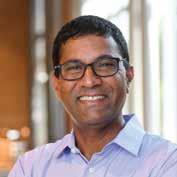
This campaign is built to support our vision to educate students for a lifetime of learning opportunities and support students as they prepare to become leaders, successful professionals and Christ-centered, servant leaders in many different contexts across the globe.
Your gift to The Messiah Fund has an immediate and direct impact on the life of a student!
“As an international student, Messiah was home for me. My major was computer science with a business minor. And it was the combination of the two that evoked a real love for my lifelong learning journey. Being invited to be a trustee at Messiah University really is coming around full circle. It’s a great honor to be asked to take on that immense responsibility and build a sustainable future for the University.”
—David Millary ’88, trustee
Learn more and give at messiah.edu/SupportStudents.


































 Fisler ’94, dean of the School of Graduate and Professional Studies
Fisler ’94, dean of the School of Graduate and Professional Studies









 NICK
Dr. Robert and Marilyn Smith Award for Outstanding Teaching: Jason Renn, assistant professor of politics
Outstanding Cocurricular Educator Award: Amy Slody, director of the Academic Success Center
NICK
Dr. Robert and Marilyn Smith Award for Outstanding Teaching: Jason Renn, assistant professor of politics
Outstanding Cocurricular Educator Award: Amy Slody, director of the Academic Success Center





































